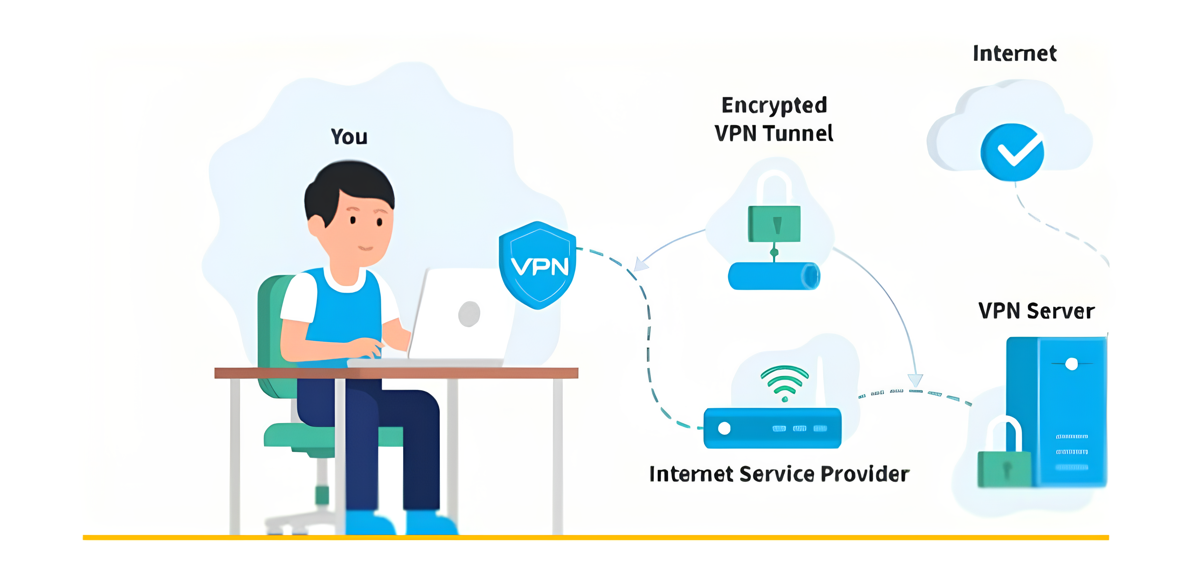VPN stands for Virtual Private Network. It helps people connect to the internet safely. A VPN creates a secure tunnel for your online activities. This tunnel keeps your information safe from others.
How Does a VPN Work?
When you use a VPN, your computer connects to a server. This server can be far away. Your data travels through this server. It hides your real location. This makes you appear in a different place on the internet.
Key Components Of A Vpn
Several important parts make a VPN work:
- VPN Client: This is the software on your device. It connects you to the VPN server.
- VPN Server: This is the computer that you connect to. It protects your data.
- Tunneling Protocols: These are rules that create the secure tunnel.
- Encryption: This makes your data unreadable to others.
Why Use a VPN?
There are many reasons to use a VPN. Here are some of the most common reasons:
- Privacy: A VPN keeps your online activities private. No one can see what you do online.
- Security: It protects your data from hackers. This is important when using public Wi-Fi.
- Access Content: Some websites are not available in every country. A VPN helps you access these sites.
- Bypass Restrictions: Some places block certain websites. A VPN helps you get around these blocks.

Types of VPNs
There are different types of VPNs. Each serves a specific purpose. Here are the main types:
- Remote Access VPN: This type connects individual users to a remote server. It is useful for people working from home.
- Site-to-Site VPN: This connects two or more networks. It is often used by companies with multiple locations.
- Mobile VPN: This type is made for mobile devices. It keeps your data safe while you are on the go.
How to Choose a VPN
Choosing a VPN can be hard. Here are some tips to help you decide:
- Check the Privacy Policy: Read what the VPN provider does with your data.
- Look for Strong Encryption: Choose a VPN that uses strong encryption methods.
- Consider Speed: Some VPNs can slow down your internet. Look for one that offers good speed.
- Check Server Locations: More servers give you more options. This helps you access more content.
- Read Reviews: See what other people say about the VPN.
Setting Up a VPN
Setting up a VPN is usually easy. Here are the basic steps:
- Choose a VPN Provider: Pick a good VPN service.
- Download the VPN Software: Follow the instructions to install it.
- Create an Account: Sign up with your email and password.
- Log In to the VPN: Open the software and sign in.
- Select a Server: Choose a server to connect to.
- Connect: Click the connect button. You are now using a VPN.
Common Misconceptions About VPNs
Many people have wrong ideas about VPNs. Here are some common misconceptions:
- VPNs Are Only for Tech Experts: Anyone can use a VPN. It is user-friendly.
- VPNs Are Illegal: Using a VPN is legal in most countries.
- VPNs Slow Down Internet Speed: Some may slow it down, but many do not.
- All VPNs Are the Same: Different VPNs have different features.
Benefits of Using a VPN
Using a VPN has many benefits. Here are some key advantages:
- Online Safety: A VPN keeps hackers away. Your personal information stays safe.
- Better Streaming: Some VPNs help you watch shows not available in your country.
- Safe Online Shopping: It protects your credit card information when you shop online.
- Privacy Protection: Your internet service provider cannot track your online activities.
Limitations of VPNs
While VPNs are great, they have some limits. Here are a few:
- Not All VPNs Are Free: Many good VPNs require payment.
- Some Websites Block VPNs: Certain sites may not allow VPN connections.
- Possible Speed Issues: Some VPNs can slow down your internet.
- Not Complete Anonymity: A VPN does not make you completely anonymous.
Frequently Asked Questions
What Is A Vpn Network?
A VPN network allows you to create a secure connection over the internet. It protects your data from hackers and snoopers.
How Does A Vpn Work?
A VPN works by encrypting your internet traffic. It routes your data through a secure server, hiding your online activity.
Why Should I Use A Vpn?
Using a VPN enhances your online privacy. It helps protect your information from cyber threats and unwanted tracking.
Is Using A Vpn Legal?
Yes, using a VPN is legal in most countries. However, some places have restrictions, so check local laws.
Conclusion
A VPN is a useful tool for online safety. It protects your data and privacy. By using a VPN, you can access content safely. It is important to choose the right VPN for your needs. Remember to research before making a choice.
VPNs are not just for tech experts. They are for everyone. With a little knowledge, anyone can use a VPN. Enjoy a safer online experience with a VPN!
